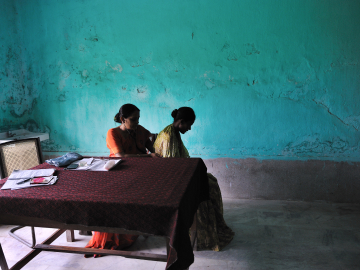Leading to Equity
Years ago, when Nancy Glass tried to submit an article on strangulation and domestic violence to the Journal of Emergency Medicine, she got a firm no—unless she listed a physician as the author, that is. Senior author.
Glass, now the professor and associate director of Johns Hopkins School of Nursing, reluctantly agreed—although the doctor listed didn’t really do anything. The paper was accepted, but that is something she refuses to do anymore.
Miriam Mutebi, Kenya’s only female breast surgeon, has some stories too. Imagine running through all the details of your patient’s treatment, only to have the patient turn to a male colleague and ask, “So what’s the plan, doctor?” Mutebi, who is also a lecturer at the Aga Khan University of Nairobi, has also heard of female medical students who have been asked to sign statements that they wouldn’t get pregnant in order to be accepted into residency programs.
Clearly, when asked to share examples of women’s barriers to career growth, the panelists had horror stories galore. But the real CUGH session’s real goal was to identify tangible steps to increase women’s leadership in global health.
At all levels, women perform most of the labor in health care. The “burden of care is on women, but they’re not at the table,” explained Michele Barry, senior associate dean, Global Health, at Stanford University. She reviewed some takeaways from the last Women Leaders in Global Health Conference:
- Diversified leadership leads to better outcome
- Men need to be included in the conversation
- Lift women up the ladder, and don’t let them pull up the ladder after
- Forget the idea of work/life balance, in favor of more realistic work-life integration
- Eliminate the pay gap
Nancy Glass shared some ideas to improve leadership opportunities for one group that provides the vast majority of global health care in the world: nurses. The nursing field, Nancy Glass said, is about 10% are men. “We’d love to have many more,” she said, “But males rise to leadership much faster.” If 2 grads are appointed to nursing posts at the hospital, identical backgrounds but one male and one female, she’d place her money on the man moving into a leadership position first. “It makes me wonder, she said. Did the young women feel they didn’t have the time, couldn’t do it? We question our abilities a lot more.”
Only about 2% of nurses have PhDs, she said. To increase that number, she wants to help young nurses get into advanced programs earlier and do research younger—a goal Hopkins has embraced. “We encourage women to get pregnant while we’re getting their PhDs,” she quipped. In practical terms, that sometimes means letting people bring their babies to class, and fostering flexibility for career paths.
We have to mentor, lead and role model that behavior, Nancy Glass said. But, getting nurses into leadership positions is not just about mentoring. “Put them up for the board. Put them up for first author,” she said. People in a position to help need to invite nurses, especially those outside the West, to be part of their research teams and co-authors.
In the Q&A following the panel, a female professor in the audience shared just how much difference one mentor made to her. She finally left her institution after realizing that despite being a lead author, despite pulling in a wealth of grant resources, she would never be granted tenure by her institution (helmed by all-male leaders). One mentor in particular changed the course of her career: panelist Roger Glass, director, Fogarty International Center (and the token man on the panel, in a refreshing twist). He embodied the highest principle of mentorship, she said: Helping someone who can do nothing for you.
On the question of how to engage more men and get men to change, Roger Glass gamely offered some tips: Work with them, teach them, and let them know if they’re stepping out of bounds. He added, “Those of us from older generations have to change along,” when it comes to language and cultural shifts.
Michele Barry added that we need men at the table; they shouldn’t shy away from events like this thinking they aren’t welcome. She urged women planning to attend the London 2018 Women Leaders in Global Health Conference in November to bring a male friend.
What else is happening at #CUGH2018? Check out Global Health NOW's conference blog.
Join the tens of thousands of subscribers in more than 100 countries who rely on Global Health NOW summaries and exclusive articles for the latest public health news. Sign up for our free weekday enewsletter, and please share the link with friends and colleagues: http://www.globalhealthnow.org/subscribe.html




